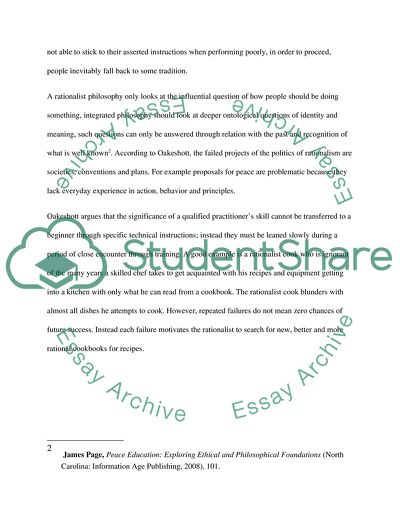Cite this document
(Comparing Michael Oakeshott's Critique of Rationalism with Arendt's Idea of the Rise of the Social Essay Example | Topics and Well Written Essays - 1500 words, n.d.)
Comparing Michael Oakeshott's Critique of Rationalism with Arendt's Idea of the Rise of the Social Essay Example | Topics and Well Written Essays - 1500 words. https://studentshare.org/history/1773310-compare-michael-oakeshott-critique-of-rationalism-with-arendts-idea-of-the-rise-of-the-social
Comparing Michael Oakeshott's Critique of Rationalism with Arendt's Idea of the Rise of the Social Essay Example | Topics and Well Written Essays - 1500 words. https://studentshare.org/history/1773310-compare-michael-oakeshott-critique-of-rationalism-with-arendts-idea-of-the-rise-of-the-social
(Comparing Michael Oakeshott's Critique of Rationalism With Arendt'S Idea of the Rise of the Social Essay Example | Topics and Well Written Essays - 1500 Words)
Comparing Michael Oakeshott's Critique of Rationalism With Arendt'S Idea of the Rise of the Social Essay Example | Topics and Well Written Essays - 1500 Words. https://studentshare.org/history/1773310-compare-michael-oakeshott-critique-of-rationalism-with-arendts-idea-of-the-rise-of-the-social.
Comparing Michael Oakeshott's Critique of Rationalism With Arendt'S Idea of the Rise of the Social Essay Example | Topics and Well Written Essays - 1500 Words. https://studentshare.org/history/1773310-compare-michael-oakeshott-critique-of-rationalism-with-arendts-idea-of-the-rise-of-the-social.
“Comparing Michael Oakeshott's Critique of Rationalism With Arendt'S Idea of the Rise of the Social Essay Example | Topics and Well Written Essays - 1500 Words”. https://studentshare.org/history/1773310-compare-michael-oakeshott-critique-of-rationalism-with-arendts-idea-of-the-rise-of-the-social.


